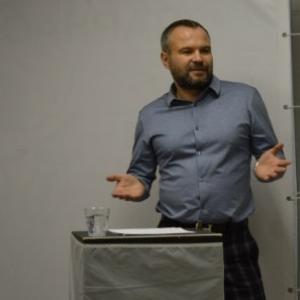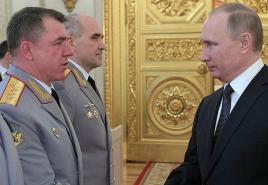Approximate program of the foreign language discipline. Department of Foreign Languages Department of Language Communication MGMSU
Assignments for independent work of a student of the dental faculty in the course “Russian language and culture of speech”
Preparing to participate in a role-playing game Verbal communication: doctor - patient
Exercise 1.Check out the material below. Be prepared to answer questions about this material, as well as use it in a doctor-patient role-playing game.
Communication barriers
1. Incompetence of one of the partners causes a feeling of frustration, a feeling of wasted time. Yes, in fact, that’s how it is. Therefore, it is very important to deal with a knowledgeable specialist, and if an error occurs, to behave according to the situation:
1) if the partner does not understand the problem at all, politely end the conversation
2) if he has partial knowledge of the issue and has no one else to turn to, bring him up to date without emphasizing his great knowledge.
2. The partner’s inability to express his thoughts clearly and consistently It really interferes with communication. Those who encounter such an interlocutor can sympathize. You will have to be patient and use all your listening skills and ask questions in order to get at least some information from your partner.
3. Poor speaking technique of the partner, slurred speech, tongue twister, very quiet or, conversely, shrill voice capable of pissing anyone off. But if you are interested in contact with this particular partner, you will have to adapt to his manner of speaking, and also not show that you are dissatisfied with something.
4. Inability to listen manifests itself in the fact that the partner interrupts, begins to talk about his own things, or goes into his own thoughts and does not react at all to your words. The only way to compensate for your partner’s inability to listen is through the art of speaking.
5. Modality barrier. Not knowing that each person has their own priority channel of perception often makes communication difficult. Here is an example of ineffective communication:
First interlocutor: “Imagine...”
Second interlocutor: “Listen to me...”
Truly, they speak different languages!
In the domestic sphere, this leads to misunderstanding and resentment. For example, a mother says to her son: “How many times should I tell you: “Go eat!” It is not surprising if the visual son does not react. For him, the words would be meaningful: “Look what lunch is today!”
Or such a sketch. The wife indignantly says to her husband: “When will you throw away these terrible slippers? It’s scary to look at them.” He objects: “They are good, I feel comfortable in them.” Obviously, she is a visual learner, and he is a kinesthetic learner, and what is important to him is not the appearance of the shoes, but his feelings in them.
A lack of understanding of the existence of people in different modalities complicates relationships in the business sphere. For example: the boss’s desk is in such order that it pleases the eye. And his subordinate is in a mess, which he navigates surprisingly well. To all the boss’s remark about putting the table in order, the subordinate replies: “It’s so convenient for me” and does not understand why they are clinging to him. The boss sincerely considers this type of table a disgrace, and the subordinate is a sloppy and, moreover, obstinate worker. And both of them are unaware that each of them has their own way of perceiving the world: one primarily receives information from the eyes, the other from the hands. Knowing that each person has a certain priority channel of perception makes us more tolerant, and the ability to determine it allows us to find an adequate language of communication with a specific interlocutor, making contact with him not only conflict-free, but also effective.
So, in order to avoid a modality barrier in a communicative act, it is necessary to transmit information in the modality in which the partner is ready to perceive it, in the form in which it is understandable to him.
6. Character barrier also creates difficulties in communication. Each person has his own character, but well-mannered, self-controlled people know how to behave in such a way that their character does not become a source of conflict or even discomfort. Not everyone, however, wants and knows how to understand themselves and control themselves. People with pronounced temperamental characteristics can be awkward interlocutors.
6.1. The mobile interlocutor (an extroverted sanguine person) thinks quickly, speaks quickly, jumps from one topic to another, because everything seems clear to him. It is difficult to follow the course of his reasoning, but you cannot interrupt - he gets angry. It is recommended to let such an interlocutor speak to the end and only then clarify something or even return to the beginning of the conversation. Such people should be valued as generators of ideas.
6.2. The dominant interlocutor (choleric extrovert) likes to lead in the conversation. He speaks loudly, in a peremptory tone, and insists on his opinion. If you try to put such an interlocutor in his place, you will end up with a conflict. It is better, remaining unconvinced, to allow him to express himself as he wants, and then at the decisive moment to quietly but firmly insist on his own, and if he agrees (perhaps he is right), then with dignity.
6.3. A rigid interlocutor (introvert-phlegmatic) is a “sedentary” interlocutor. He thinks slowly and discusses the circumstances of the case in detail. Everything has been clear to you for a long time, but you cannot push it. These people are valuable as experts or critics of ideas, and you just need to be patient when talking with them.
6.4. A passive interlocutor (melancholic introvert) does not reveal his reaction and does not speak out. It is difficult to carry on a conversation with him. Should
apply method active listening: asking questions, paraphrasing, etc.
And try to figure out his silence. Silence is not always a sign of consent.
To be able to carry on a conversation with all business partners - isn’t this an indicator of a high communication culture?
Contributions to the successful work were made by the heads of the department, Associate Professor E. V. Gorbunova (headed the department for 25 years) and Associate Professor I. R. Prudnikova (headed the department for 17 years), whose work was awarded by government awards.
Since 2012, the Department of Foreign Languages and Computer Science has been headed by Candidate of Philological Sciences, Associate Professor Elena Vladimirovna Bessonova.
English, French and German languages, both traditional and foreign ones are used communication techniques, allowing students to master the language in everyday and professional communication. The department maintains continuity in terms of high pedagogical and linguistic qualifications of teachers. Teachers of the department regularly improve their level on the basis of MGSU, as well as in large Russian universities in the country, linguistic centers and abroad. Teachers also actively participate in university, city, all-Russian and international conferences. Foreign internships for undergraduate and graduate students are regularly conducted in France (Nice, Institute of Linguistics Alpha B.), Ireland, Germany (Berlin, Weimar School of Architecture.)
Teachers of the department conduct classes for students (bachelors, masters and specialists) of all directions and specialties in the following main disciplines:
Foreign language
Foreign language 2
Foreign language in the field of professional communication
Foreign language in the professional sphere
Business foreign language
Business foreign language in the field of information technology
Foreign language (business)
Teachers of the department are engaged scientific activities and lead methodological work. One of the areas of scientific and methodological work of the department is the creation modern textbooks, manuals and other educational materials aimed at developing foreign language competence of students and graduate students in the university profile.
Every year the department holds subject Olympiads and scientific and technical conferences in four languages (English, French, German, Spanish). Students' interest in such events is growing, and the best student reports are published in the university's scientific collections. Undergraduate and graduate students who continue to study a foreign language have the opportunity to intern at foreign universities.
New opportunities are opening up for the department thanks to the attention and assistance of the university leadership. Within the framework of the State educational standard of higher education vocational education It is impossible to realize the huge need of students and future specialists in a foreign language. They need foreign languages exclusively functionally, for use in various spheres of society as a means of real communication with people from other countries, as well as in the field of professional communication. This demand initiated management to create multi-level courses foreign languages, meeting the different needs of today's student and allowing future specialists to become competitive in the labor market:
· - Business English course.
· - Special English language course for entry-level language proficiency.
· - Program of additional (to higher) education "Translator in the field of professional communication".
The department employs 31 people - 26 teachers and 4 educational and support staff.
GBOU VPO MGMSU im. A.I. Evdokimova
Department of Language Communication
"TEACHING MANUAL FOR MEDICAL UNIVERSITY STUDENTS
ON INDEPENDENT WORK"
(on electronic media)
ON A PROFESSIONALLY ORIENTED COURSE
"RUSSIAN LANGUAGE AND CULTURE OF SPEECH"
Assignments for independent work of 1st year students
Faculty of Social Work
Questions about lectures
I. Topic: “Speech culture as an academic discipline”
1. What is speech culture?
2. What is the subject of speech culture as academic discipline?
3. What are its main tasks?
4. What is the main objective speech culture course?
5. What aspects does speech culture include?
6. What is the normative aspect of speech culture?
7. What skills make up communication aspect speech culture?
8. How can you characterize the ethical aspect of speech culture?
II. Topic: “Language and Speech”
1. What is language?
2. What are non-linguistic sign systems?
3. What are the functions of language?
4. What units, levels, sections of the language do you know?
5. What is a literary language and its non-literary varieties?
6. How would you define the concept of “literary language”?
7. What is the difference between the literary and national languages?
8. What is speech?
III. Topic: “Norms of Russian literary language»
1. What is the norm?
2. What main types of norms do you know?
3. How to characterize other types of norms?
IV. Topic: “Varieties of speech”
1. What are the differences between spoken and written language?
2. Talk about the dialogue.
a) What is dialogue?
b) What is its structure?
c) What types of dialogues are there?
3. Tell us about the monologue.
a) What is a monologue?
b) What is its structure?
c) What types of monologues are there?
4. What functional and semantic types of speech do you know? Describe each of them.
5. What functional speech styles do you know? Describe each of them.
V. Topic: “Scientific style of speech”
1. Name the sphere of social activity in which the scientific style of speech functions.
2. What extralinguistic signs do you know of it?
3. What linguistic means form this functional style?
4. Name the speech genres of the language of science (oral and written form).
VI. Topic: “Speech business conversation»
1. What is communication?
2. What is speech communication?
3. What is the structure of speech communication?
4. Purposes of verbal communication? (Give examples of immediate and long-term goals.)
5. What roles do you know in the process of speech communication?
6. List the types of questions, characterize the situations of their appropriate use.
7. List the tactics you know to overcome communication barriers:
§ depending on the style characteristics of the participants in communication;
§ depending on the psychological type of the interlocutors;
§ depending on the type of speech behavior of the interlocutor;
8. What factors influence the improvement of verbal communication:
§ the ability to ask a relevant question or say a certain phrase in a timely manner;
§ recognition of the interlocutor by psychological type, by type of speech behavior;
§ skillful use of questions, speech cliches;
§ compliance with the “golden rules”;
§ compliance with ethics;
§ listening skills.
9. What are communication barriers?
10. Name and characterize communication barriers.
11. What is a character barrier?
12. How are the stylistic characteristics of the participants in communication manifested? (Speaking styles and listening styles)
13. How is the structure of the conversation formed? How do you understand the communicative technique of establishing speech distance (personal)?
14. Talk about the role of the listener, about the reflexive and non-reflective situation. Name techniques for effective listening.
15. Talk about the role of the listener, about reflective and non-reflective listening. Name techniques for effective listening.
VII. Topic: “Public Speaking”
1. What is public speaking?
2. What is the purpose of public speaking?
3. What are the typical techniques for developing the text of a speech?
4. How is the text of a public speech structured? What is the order of correlation between the main thesis and theses that reveal its content?
5. What arguments can be used in the text of a public speech in defense or refutation of a particular thesis?
6. What types of arguments are appropriate to use in your speech?
7. What are the rules for using statistical data?
8. How should quotations be used?
9. In what order should the arguments be placed?
10. What special speech actions serve to establish and maintain contact between the speaker and the audience?
a) What is the purpose of metatextual structures?
b) What are the techniques for dialogizing the text of a speech and what is their role?
11. What needs to be done with the written text of the speech for its oral presentation (vocabulary, syntax, morphology)?
12. What are the logical and intonation-melodic patterns of oratorical speech?
13. How should the speaker be dressed?
14. What is the appropriate way to behave during a speech?
The Department of Foreign Languages was founded in 1930 and today is one of the largest departments of the First Moscow State Medical University named after. I.M. Sechenov, actively participates in the process of training modern highly qualified specialists in the field of medicine and pharmacy.
The goal of professional oriented foreign language training carried out by the department is to acquire communicative competence by future doctors and pharmacists, mastering oral and written forms of communication in a foreign language as a means of information activities and further self-education in the professional field.
The department teaches a basic foreign language course - English, German or French - at the following faculties:
- medicinal
- dental
- medical and preventive
- higher nursing education
- pharmaceutical (including evening and correspondence departments).
In 2010, the department began teaching foreign languages to students in new specialties:
- clinical psychology
- biotechnology and bioengineering
- pediatrics
- social work
The Department of Foreign Languages is one of the most numerous departments in terms of personnel of the First Moscow State Medical University named after. I.M. Sechenov, her team consists of 50 faculty members. Currently, the department has a professor and two associate professors. A number of teachers have academic titles: the team includes 1 Doctor of Psychological Sciences, 4 Candidates of Philological Sciences, 1 Candidate of Pedagogical Sciences, 1 Candidate of Medical Sciences, 1 Candidate of Technical Sciences.
Four teachers of the department are graduate students and applicants of the Moscow State University linguistic university, Russian University Friendship of Peoples, Institute of Linguistics of the Russian Academy of Sciences, are working on candidate dissertations.
Currently, the department is headed by an honored worker high school Russian Federation, associate professor, candidate of philological sciences, Irina Yuryevna Markovina.
I. Yu. Markovina is a highly qualified modern specialist, one of the leading domestic scientists and researchers involved in the problems of ethnopsycholinguistics, and works in the field of methods of teaching foreign languages, translation and intercultural communication. Under her leadership, the department’s staff created for the first time an educational complex “ English language» for doctors: a basic textbook, a workshop on grammar and a workshop on oral professional communication; as well as a series of new medical dictionaries: English-Russian Medical Dictionary (MIA, 2008), New German-Russian and Russian-German Medical Dictionary ("Living Language", 2009), New English-Russian and Russian-English Medical Dictionary ("Living Language" language", 2009). The department staff also created an English textbook for pharmacists of the new generation, including workbook for a student.
I. Yu. Markovina is a professor at the Department of Psycholinguistics at Moscow State Linguistic University, conducts original seminars and lecture courses in Russia and abroad (Great Britain, the Netherlands, Germany, South Africa, Finland). Member of the editorial board of the journal “Problems of Psycholinguistics”. Has more than 100 publications in Russian, English and German.
In 2006, with the support of the university administration, a program of additional professional education “Translator in the field of professional communication” was opened, headed by I. Yu. Markovina.
RUSSIAN FEDERATION
MINISTRY OF HEALTH AND SOCIAL
DEVELOPMENT OF THE RUSSIAN FEDERATION
| I APPROVED ____________ _____________________ (signature) (full name) "____" ________ 20.. |
|||
| Enters into force from "____" ________ 20... |
|||
SAMPLE DISCIPLINE PROGRAM |
|||
| ^ FOREIGN LANGUAGE (English) |
|||
| For students studying in: | |||
| specialties | Dentistry |
||
| Form of study | full-time |
||
| Moscow 2010 |
|||
^ Goals and objectives of the discipline:
The goal of professionally oriented foreign language teaching at a medical school is for future doctors to acquire the communicative competence necessary for intercultural communication and professional communication, mastery of oral and written forms of communication in a foreign language as a means of information activity and further self-education. This goal is complex, including, in addition to practical (communicative), educational and educational goals.
^ Objectives of the discipline;
Ensure that students acquire communicative competence, the level of which will allow them to use a foreign language practically both in professional and scientific activity, and for further self-education;
Explain the fundamental difference between the two forms of language, i.e. oral and written forms of communication;
Teach basic language forms and speech formulas to express certain types of communicative intentions;
To introduce the mechanisms of constructing complex and derivative words, general scientific medical and basic dental terminology in texts and in oral communication;
Teach the main types of reading: studying, viewing, searching and introductory;
Teach the use of a foreign-Russian dictionary and the ability to adequately translate for an accurate understanding of the content of the text;
Learn to express your thoughts using acquired language means and acquired skills, and understand partners adequately to the communication situation (sociocultural competence).
^ Place of discipline in the structure of OOP specialist:
The discipline “Foreign Language” belongs to the humanitarian, social and economic cycle. To study the discipline “Foreign Language” at a medical university, a student must have the following knowledge, skills and competencies:
Knowledge of phonetics, vocabulary, grammar obtained while studying this discipline in a general education institution;
Knowledge of the structure of the native language;
Stock of international vocabulary;
Basic Greek-Latin term elements studied in the course Latin language and medical terminology;
Automated language skills provided by the school curriculum;
Knowledge gained by studying cycles of humanities, natural sciences, biomedical and clinical disciplines at a medical university.
^ Competency level:
Active knowledge of a foreign language as a means of oral and written communication in everyday, professional and socio-cultural areas.
Communication skills:
Be able to take part in a conversation on a studied topic and express your attitude to the text read, using the acquired vocabulary and speech models.
^ 3. Requirements for the results of mastering the discipline:
The process of studying the discipline is aimed at developing the following competencies:
Capable and ready to use in practice the methods of the humanities, social, economic, natural sciences, biomedical, and clinical sciences in various types professional and social activities;
Able to analyze significant political events and trends, to participate responsibly in political life, knows the basic concepts and laws of the world historical process; understands the role of violence and non-violence in history, the place of man in the historical process, the political organization of society, knows historical terminology, uses historical and medical terminology, knows how to evaluate state policy, including in the field of health care;
Able to use medical terminology, scientific, medical and paramedical information, domestic and foreign experience on the topic of research, able to correctly format the Latin part of the prescription;
Able to form new personal qualities: critical of oneself, one’s stereotypes and habits, has flexible thinking, is able to cooperate and conduct dialogue, critically evaluate information, be able to analyze and synthesize, be morally responsible for the assigned work, is capable of creative adaptation in real life environment;
Capable of working with original literature in the specialty, written and oral communication in state and foreign languages, preparing and editing texts of professional and socially significant content; capable of forming systematic approach to the analysis of medical information, perception of innovation, critical perception of information;
Capable of argumentation, discussion, social interaction with society, community, team, family, friends, partners; to tolerance, respect and acceptance of the Other; to social mobility;
Able to cooperate with colleagues and work in a team, organize the work of performers, and make optimal management decisions;
Able to carry out activities in various fields public life taking into account the moral and legal norms accepted in society; comply with the rules of medical ethics and deontology, laws and regulations on working with confidential information;
Able to use competently professional activity computer equipment, medical and technical equipment, ready to use modern information technologies to solve professional problems.
b) professional (PC):
research activities
Capable and ready to study scientific, medical and paramedical information, domestic and foreign experience on the topic of research.
As a result of studying the “Foreign Language” discipline, the student must:
Know:
Lexical minimum in the amount of 2500 educational lexical units of a general and terminological nature;
Basic medical and pharmaceutical terminology in a foreign language;
Basic word-formation models, on the basis of which you can independently discover the meaning of unfamiliar complex and derivative words;
Productive: simple declarative sentences to construct your own statement;
Basic types of questions to maintain a conversation;
- degrees of comparison of adverbs; reflexive verbs; English Tenses active and passive voices; participles, their forms and functions; infinitive, its forms and functions; gerund (simple form);
Noun Substitutes one(s), that(those); paired unions; complex object, complex subject - their structures and methods of translation; infinitive in simple and perfect form after modal verbs; conditional sentences; independent participle phrase; compound and complex sentences.
Be able to:
Pronounce at the level of automaticity all the sounds of the foreign language being studied, providing the opportunity for the listener to understand the spoken text;
Participate in a conversation on a studied topic and express your attitude to the text read, using the learned minimum vocabulary and speech models;
Work with various dictionaries to expand your vocabulary.
Own:
2500 lexical units, of which 1200 are productive;
The main grammatical structures typical for the sublanguage of medicine (receptive);
The main grammatical models necessary for professionally oriented communication in situations on the intended topic (productive);
- skills in reading and writing clinical and pharmaceutical terms and recipes in a foreign language;
A foreign language to the extent necessary to be able to obtain information from foreign sources.
^
4. Scope of discipline and types academic work
| Type of educational work | Total Hours/Credits | Semesters |
| 1 |
||
| Classroom lessons (total) | 72 | 72 |
| Including: | - | - |
| Practical exercises (PL) | 72 | 72 |
| ^ Independent work (total) | 36 | 36 |
| View intermediate certification(test, exam) | test |
|
| ^ Total labor intensity hours credit units | 108 | |
| 3,0 |
^ 5. Contents of the discipline
5.1. Contents of discipline sections
| № p/p | Name of the discipline section | Section Contents |
| 1. | Phonetics, orthoepy | The student must have an automatic pronunciation of all sounds of the foreign language being studied to a degree that provides the listener with the opportunity to understand the spoken text. The student must also master the intonation contours characteristic of sentences in the foreign language being studied. |
| 2. | Grammar (morphology, syntax, punctuation) | Word formationaffix word formation:
Compounding Greco-Latin term elements in the process of word formation ^ Sentence structural types: interrogative with a question word (turnover), without a question word (turnover), narrative (affirmative, negative), motivating; simple, compound, complex. ^ Simple sentence structure
|
| 3. | Vocabulary |
Bones of the upper and lower jaw. |
(Content is indicated in didactic units)
^
5.2. Sections of the discipline and interdisciplinary connections with the provided (subsequent) disciplines
| № p/p | Name provided (subsequent) disciplines | Communication discipline for studying provided (subsequent) disciplines |
| 1. | General hygiene | + |
| 2. | Prevention of dental diseases | + |
| 3. | Public health and healthcare | + |
| 4. | Hospital orthopedic dentistry | + |
| 5. | Hospital therapeutic dentistry, periodontology and geriatric dentistry | + |
| 6. | Hospital surgical dentistry | + |
| 7. | Pediatric therapeutic dentistry | + |
| 8. | Orthodontics and pediatric prosthetics | + |
^
5.3. Sections of disciplines and types of classes
Note : The specifics of teaching a foreign language at a non-linguistic university do not provide for its aspect-by-section (by section) teaching. Due to the limited number of hours allocated to studying this discipline at a medical university, all three sections of a foreign language are taught to students in a complex, and therefore it is impossible to indicate the exact number of hours allocated for each section.
^
5.5. Practical lessons
| № p/p | Name of topics for practical classes of the discipline and forms of control | Semesters |
| 1st semester |
||
| 1 | Medical and dental education in Russia, Great Britain and the USA. Moscow State Medical and Dental University. | 4 hours |
| 2 | Human anatomy. Skeleton. Bone structure. Muscles of the maxillofacial region. Skull bones. | 10 hours |
| 3 | Physiology. Organs of the oral cavity. | 10 hours |
| 4 | Dentistry. Teeth: formation, structure and eruption of teeth. Dental tissues. Bones of the upper and lower jaw. | 12 hours |
| 5 | Diseases of the teeth and oral cavity. Caries, pulpitis, periodontal diseases and oral mucosa. | 12 hours |
| 6 | Treatment and prevention of dental diseases. | 10 hours |
| 7 | Prevention of cancer in dentistry | 4 hours |
| 8 | My future specialty is dentistry (generalist, orthodontist, surgeon, etc.). | 6 hours |
| 9 | Health care system in Russia, Great Britain and the USA. | 4 hours |
^ 5.6. Laboratory works not provided
5.7.Seminars not provided
6. Approximate topics of abstracts:
Historical facts of the development and formation of dentistry as a science.
Modern dentistry.
Oral hygiene and dental care.
Prevention of caries.
Dental education in target language countries.
^ 7. Educational, methodological and information support of the discipline:
A) basic literature
English language. English in Dentistry. Edited by prof. L.Yu.Berzegova. Textbook for dental students. M., 2009.
Tests and tests in English for students of the Faculty of Dentistry. M., 2005.
R.Murphy. English Grammar in Use. Intermediate. – Cambr. Univ. Press, 2008.
b) additional literature
English for dental students. V.V. Mukhina. Textbook. M., 2003.
The Language of Medicine in English. Ethel Tiersky.
Test Your Professional English. Medical. Alison Pohl.
Articles from English and American dental magazines.
c) dictionaries
New English-Russian medical dictionary for dentists. Berzegova L.Yu., Kovshilo D.F., Kuznetsova O.V., M., Solomentseva L.N., M., 2009.
English-Russian dictionary of medical abbreviations. Kovshilo D.F., Kuznetsova O.V., M., Solomentseva L.N., Berzegova L.Yu., Rudinskaya L.S. M., 2004.
Large Russian-English medical dictionary. Benyumovich M.S., Rivkin V.L., M., 2000.
Means of ensuring the mastery of the discipline.
To successfully teach a foreign language in a non-linguistic university, the following tools are used:
Textbooks, teaching aids and tests (with situational tasks) created at the Department of Foreign Languages of the Moscow State Medical University and other medical universities;
tables with phonetic symbols and grammar rules;
posters with brief descriptions symptoms of dental diseases;
audio materials for classroom and homework;
films and videos on regional studies and dental (special) topics;
computer programs; materials from Internet",
Audio and video materials used in foreign language classes
Video material on the topic “Human Anatomy”.
Video material on the topic “Human Physiology”.
Video: “Basic systems of the human body.”
Video material on the topic “Treatment of dental diseases.”
Video material on the topic “Prevention of dental diseases.”
Video material on the topic “From the history of the development of dentistry in the UK.”
Video material on the topic “Combined fixed-removable denture.
Video films: “AIDS. Reality and myth", "World against AIDS", "AIDS: common efforts will stop it."
Video films: “London”, “Washington”, “New York”.
^ 8. Material and technical support of the discipline:
classrooms equipped with phonetic and grammar
tables;
computer class connected to the Internet;
language laboratory operating in 3-program mode;
audio and video recorders, DVD players.
^ 9. Guidelines on organizing the study of the discipline:
1. Teaching a foreign language at a medical university is considered as a mandatory component of the professional training of a medical specialist, and proficiency in a professionally oriented foreign language is considered as one of the indicators of the degree of general education of a modern person.
In accordance with the requirements of the Federal State Educational Standard for Higher Professional Education, knowledge of a foreign language is a prerequisite for conducting modern scientific research in the field of theoretical and practical medicine and, accordingly, the implementation of the competency-based approach should include the widespread use in the educational process of active and interactive forms of conducting classes (computer simulations, business and role playing games, analysis of specific situations, psychological and other trainings) in combination with extracurricular work in order to form and develop professional skills of students.
In this regard, an important factor is the formation of a student’s foreign language communicative competence, which allows students to satisfy their life and educational needs in their chosen field of activity, in our case in medicine and dentistry, the compilation and publication of specialized (dentistry) textbooks, teaching aids and visual aids . The stock of terminological vocabulary formed during the learning process, the selection of grammatical constructions that are most common in scientific texts on dentistry, and the compilation of sets of grammatical exercises based on a minimum lexical dictionary will allow the student in the future to successfully continue self-education in the field of reading and translating literature in the specialty.
The course of the discipline “Foreign Language”, designed for 72 classroom hours, should be considered as a propaedeutic discipline in teaching the basics of professional activity using a foreign language.
2. The triad “teacher - student - educational materials” present in the educational process should be a dynamic structure so that during the classroom session various combinations of the main components of speech activity are possible, i.e. actions and operations: “teacher - students”, “teacher - students - educational material”, “teacher -
student", "student - educational material", etc.
3. Variability of such work can be achieved with rational
use of technical training aids and manuals,
providing not only deductive, but also inductive methods
presentation of educational material.
4. Independent work (36 hours) with literature, writing case histories and abstracts in a foreign language form the ability to analyze medical and social problems in various types of professional and social activities.
Various types of educational work, including independent work of the student, contribute to mastering the culture of thinking, the ability to logically correctly formulate its results in written and oral speech; readiness to form a systematic approach to the analysis of medical information, perception of innovations in a foreign language; form the ability and readiness for self-improvement, self-realization, personal and subject reflection.
Various types of educational activities form the ability, in the context of the development of science and practice, to reassess the accumulated experience, analyze one’s capabilities, the ability to acquire new knowledge, use various shapes training, information and educational technologies.
5. Independence in studying a foreign language at a non-linguistic university, like any other discipline, is one of the main didactic principles and its role cannot be overestimated. In order to develop independent work (SI) of students, the following links, or stages of teaching and learning, are distinguished:
the student’s awareness of educational goals and objectives, the formulation of problems, what is associated with the formation of interest in language classes, the formation of an appropriate internal attitude towards activity, a positive attitude towards SR;
introducing students to new material using various
visual and technical means, removal of basic vocabulary
grammatical difficulties that could weaken interest in the work ahead;
teacher's guidance of generalization processes from the outside
students: mastery general concepts using mental operations and problem solving;
systematization and consolidation of students’ knowledge;
formation of abilities, skills and habits of studying the language
on one's own;
control and evaluation of learning results, and in the learning process - self-control.
6. Individualization in learning is one of the ways to develop the principles of independence and creative activity. The effectiveness of teaching increases if, when distributing educational materials for SR students, the teacher takes into account their individual psychological characteristics. Individual approach to the student in the learning process allows, first of all, to implement the most important didactic principle - constant movement from simple to complex, and also stimulates a conscious attitude towards the work being performed. However, learning a language is learning to communicate. Collective forms of work, and among them, primarily pair work, should prevail.
But it should be taken into account that collective forms of educational activity will be effective only if they are preceded by individual SRS both in classroom lessons under the guidance of a teacher and outside the classroom.
Only under these conditions will the student experience true satisfaction from the results of his work, which is consistent with the ultimate goal of teaching a foreign language at a university and with the social and personal needs of the student.
Developers:
| Place of work | Position held | Initials, surname |
| ^ | Head of the department, Professor | L.Yu.Berzegova |
| MGMSU, Department of Foreign Languages | Head of the educational department, assistant professor | G.I. Filippskikh |
2024 my-cross.ru. Cats and dogs. Small animals. Health. Medicine.







